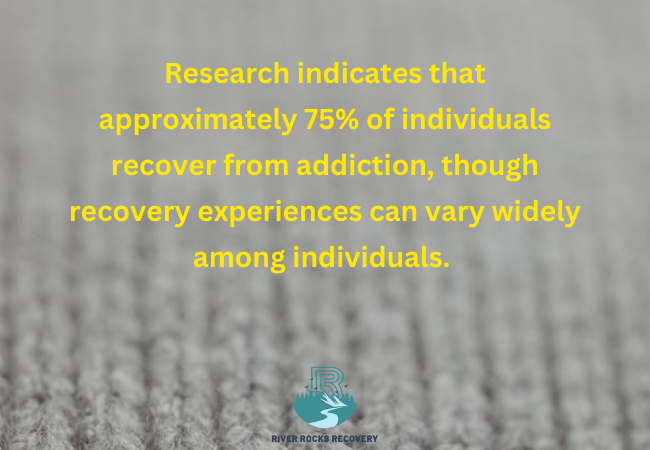For individuals struggling with alcohol addiction, deciding to seek treatment is one of the most important steps toward reclaiming their lives. However, a common concern among those considering rehab is: Does alcohol rehab actually work?
The answer is yes—but the effectiveness of rehab depends on multiple factors, including treatment duration, individual commitment, therapy approaches, and long-term support. At River Rocks Recovery, we provide comprehensive alcohol rehab treatment in Ohio, equipping individuals with the tools and resources needed for lasting sobriety.
In This Guide, We Will Cover:
- The success rates of alcohol rehab
- The key factors that influence treatment effectiveness
- What happens during alcohol rehab
- The role of ongoing care after rehab
- The importance of individualized treatment plans
- Common challenges in alcohol recovery and how to overcome them
If you or a loved one is considering alcohol rehab treatment in Ohio, this guide will help you understand what to expect and how to maximize the benefits of treatment.
Does Alcohol Rehab Work? Understanding the Success Rates
Alcohol Rehab Success Rates
Alcohol rehab is highly effective, but success is not guaranteed overnight. Studies show that:
- 75% of people with addiction recover, with many achieving long-term sobriety through structured rehab programs and aftercare.
- Longer treatment durations lead to better success rates—individuals who complete 90 days or more of treatment have significantly higher success rates than those in shorter programs.
- Integrated treatment approaches, such as combining behavioral therapy, medication-assisted treatment (MAT), and peer support, increase long-term recovery success.
Why Do Some People Relapse After Rehab?
While relapse is common in addiction recovery, it does not mean that treatment has failed. Instead, relapse is a signal that adjustments are needed in an individual’s treatment or aftercare plan. Studies show that:
- 40-60% of individuals relapse at some point in recovery, similar to relapse rates for chronic diseases like diabetes or hypertension.
- Individuals who engage in long-term therapy and support programs (e.g., outpatient care, 12-step groups) are significantly less likely to relapse.
- Identifying and managing triggers through therapy and relapse prevention strategies improves long-term success.
Key Factors That Influence Alcohol Rehab Success
Not all rehab programs are the same. The success of alcohol rehab depends on several critical factors, including:
1. Length of Treatment
- 30-day programs provide a foundation for recovery, but longer treatment improves outcomes.
- 60-90 days of rehab are often more effective, allowing individuals to address deeper emotional and behavioral issues.
- Ongoing outpatient treatment further strengthens sobriety by reinforcing coping strategies.
2. Type of Treatment Program
At River Rocks Recovery, we offer various levels of care to meet individual needs:
- Inpatient Rehab (Residential Treatment): 24/7 medical care and therapy in a structured setting.
- Partial Hospitalization Program in Ohio: A structured, intensive treatment program while allowing individuals to return home at night.
- Intensive Outpatient Program in Ohio: Flexible therapy that supports recovery while maintaining work and family responsibilities.
- Outpatient Program in Ohio: Long-term counseling and support to reinforce relapse prevention.
Choosing the right treatment level is crucial to ensuring success in rehab.
3. Therapy and Behavioral Treatment
Alcohol rehab incorporates evidence-based therapies that help individuals change negative thought patterns and behaviors. These include:
- Cognitive Behavioral Therapy (CBT): Identifies and changes destructive thinking patterns.
- Dialectical Behavior Therapy (DBT): Focuses on emotional regulation and stress management.
- Group Therapy: Builds a strong peer support system.
- Family Therapy: Heals relationships and strengthens the individual’s support network.
4. Dual Diagnosis Treatment for Mental Health Disorders
Many individuals with alcohol addiction also suffer from anxiety, depression, PTSD, or other mental health disorders. Rehab programs that treat both addiction and mental health issues (dual diagnosis) have higher success rates.
5. Aftercare and Ongoing Support
Rehab is just the first step—continued outpatient care, sober living, and support groups are essential for maintaining sobriety.
What to Expect During Alcohol Rehab
1. Medically Supervised Detox (If Needed)
For individuals with severe alcohol dependence, medical detox is often required to safely manage withdrawal symptoms such as tremors, nausea, anxiety, and seizures. Detox typically lasts 5-10 days.
2. Therapy and Counseling
Once detox is complete, individuals begin intensive therapy, including:
- One-on-one counseling to explore personal struggles and triggers.
- Group therapy to gain support and learn from others.
- Behavioral therapy to develop healthier coping mechanisms.
3. Life Skills Training and Relapse Prevention
- Learning healthy coping strategies for stress and cravings.
- Developing relapse prevention plans to navigate high-risk situations.
- Gaining skills for healthy relationships and emotional regulation.
4. Transitioning to Outpatient Care
After inpatient rehab, individuals may transition to an outpatient program or sober living to continue their recovery journey.

Common Challenges in Alcohol Rehab and How to Overcome Them
While rehab is effective, individuals may face challenges in their recovery journey. Here’s how to address them:
1. Overcoming Cravings
- Engage in therapy to develop coping skills.
- Use mindfulness and relaxation techniques to manage urges.
- Stay connected to a support group for accountability.
2. Managing Emotional Triggers
- Therapy helps identify emotional triggers and develop healthy responses.
- Avoid environments associated with drinking to reduce temptation.
3. Rebuilding Relationships
- Family therapy helps heal past wounds and improve communication.
- Setting boundaries with people who still drink is essential.
4. Finding Purpose in Sobriety
- Engage in hobbies, work, or volunteering to build a fulfilling life.
- Set personal goals to stay motivated in recovery.
Overcoming these challenges increases the likelihood of long-term sobriety.
How to Maximize Long-Term Recovery
- Commit to a structured treatment plan that includes inpatient or outpatient care.
- Build a strong support network of sober friends, family, and therapists.
- Engage in therapy and support groups to maintain accountability.
- Practice self-care through healthy habits like exercise, mindfulness, and stress management.
- Continue aftercare treatment to strengthen coping skills and relapse prevention.
How River Rocks Recovery Can Help
At River Rocks Recovery, we are committed to helping individuals achieve lasting sobriety through personalized treatment programs, including:
- Alcohol Rehab Treatment in Ohio – Evidence-based care for alcohol addiction.
- Partial Hospitalization & Intensive Outpatient Programs – Flexible options for different recovery needs.
- Outpatient Therapy & Relapse Prevention – Ongoing support for lifelong recovery.
At River Rocks Recovery, we offer personalized addiction treatment programs tailored to each individual’s needs. Whether you require inpatient rehab, outpatient support, or long-term relapse prevention, our dedicated team is here to help. If you or a loved one is struggling with alcohol addiction, don’t wait to get help. Alcohol rehab works when you have the right support and treatment plan.
Conclusion
Alcohol rehab is an effective and life-changing solution for those struggling with addiction. While recovery is a challenging journey, research and real-life success stories show that rehab works when individuals receive the right treatment, commit to the process, and have a strong support system.
Rehab provides the tools, therapy, and resources needed to break free from alcohol dependence, but long-term sobriety requires ongoing care, lifestyle changes, and dedication to personal growth. Continued therapy, outpatient programs, peer support groups, and relapse prevention strategies all play a role in maintaining success after treatment.
If you or a loved one is struggling with alcohol addiction, don’t wait to seek help. Alcohol rehab works, and recovery is possible with the right support. Call River Rocks Recovery at 888.905.6281 today to begin your journey to sobriety. You deserve a future free from alcohol addiction. Take the first step toward a healthier, sober life today.
FAQ About Alcohol Rehab Success
Does alcohol rehab really work?
Yes! Alcohol rehab provides individuals with medical support, therapy, and relapse prevention tools to help them overcome alcohol addiction. Studies show that 75% of individuals recover from addiction when they receive structured treatment and long-term support.
What factors affect the success of alcohol rehab?
Several factors influence alcohol rehab success, including:
- Length of treatment (90+ days improves success rates)
- The type of rehab program (inpatient, outpatient, PHP, or IOP)
- Use of therapy and behavioral treatment (CBT, DBT, and group therapy)
- Ongoing aftercare and relapse prevention
What are the success rates of alcohol rehab?
- People who complete a 90-day rehab program have higher success rates than those in shorter programs.
- 40-60% of people relapse, but continued therapy, outpatient care, and peer support significantly reduce relapse risk.
- Medication-assisted treatment (MAT) combined with counseling further improves long-term sobriety.
How long does alcohol rehab take?
The length of alcohol rehab depends on individual needs and program types:
- Detox: 5-10 days
- Inpatient Rehab: 30-90 days
- Partial Hospitalization Program (PHP): 2-4 weeks
- Intensive Outpatient Program (IOP): 8-12 weeks
- Outpatient Program (OP): Several months to a year or longer
Can I relapse after alcohol rehab?
Yes, relapse is a common part of the recovery process, but it does not mean failure. Many individuals require ongoing therapy, outpatient support, and peer support groups like Alcoholics Anonymous (AA) to maintain sobriety. The key is to have a strong relapse prevention plan in place.
What happens after rehab?
After rehab, individuals should continue with:
- Outpatient therapy for relapse prevention
- Support groups like AA or SMART Recovery
- Sober living environments for structure and accountability
- Lifestyle changes to avoid triggers and maintain a healthy routine




























